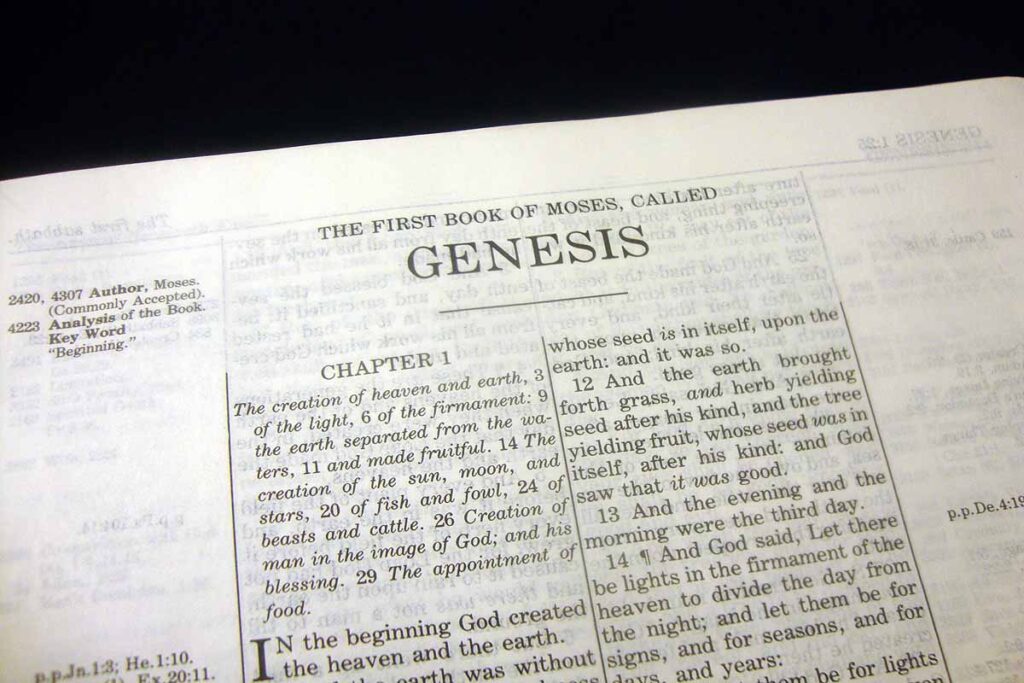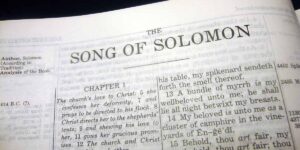In the book of Genesis, God created the sky, seas, and land. He created plants, animals, fish, and birds. But he created human beings in his own image. At times, others may treat us disrespectfully. But we can be certain of our dignity and worth because we have been created in the image of God. When Adam and Eve were created by God, they were without sin. But they became sinful when they disobeyed God and ate some fruit from the tree. Through Adam and Eve, we learn about the destructive power of Sin and its bitter consequences.
Noah was spared from the destruction of the flood because he obeyed God and built the ark. Just as God protected Noah and his family, he still protects those who are faithful to him today.
Abraham was asked to leave his country, wander in Canaan, wait years for a son, and then sacrifice him as a burnt offering. Through these periods of sharp testing, Abraham remained faithful to God. His example teaches us what it means to live a life of faith. Isaac did not demand his own way. He did not resist when he was about to be sacrificed, and he gladly accepted a wife chosen for him by others. Like Isaac, we must learn to put God’s will ahead of our own.
Jacob did not give up easily. He faithfully served Laban for over 14 years. Later, he wrestled with God. Although Jacob made many mistakes, his hard work teaches us about living a life of service for our Lord.
Joseph was sold into slavery by his brothers and unjustly thrown into prison by his master. Though the life of Joseph, we learn that suffering no matter how unfair, can develop a strong character in us.
Writer of Genesis
The book of Genesis gives no notice about its author. The early church, however, held to the conviction that Moses wrote the book, as did the Jerusalem Talmud and the first-century Jewish historian Josephus. In spite of the number of modern scholars who reject Mosaic authorship of Genesis, the traditional view has much to commend it. Both the Old Testament and the New Testament contain frequent testimony to the Mosaic authorship of the entire Pentateuch.
Date Written
The traditional date of the Exodus from Egypt is the mid-fifteenth century B.C. First Kings 6:1 states that Solomon began building the temple “in the four hundred and eightieth year after the children of Israel had come out of the land of Egypt.” Solomon is thought to have begun construction about 960 B.C., dating the Exodus about 1440 B.C. So Moses wrote Genesis after 1440 B.C., during the forty years in the wilderness.
Theological Contribution
The book of Genesis is a primary source for several basic doctrines of the Bible. The book focuses on God primarily in two areas: He is the Creator of the universe, and He is the one who initiates covenant is the same God who has created the entire universe. The eternal God and almighty Creator enter into covenant with His people (Genesis 1:1; John 1:1).
God’s covenant with Abraham is the basic plot of the Scripture: to accomplish His plan for the nations of the world through His people Israel, the descendants of Abraham. The covenant (Genesis 12:1-3; 15:1-21) contains a number of personal blessings on the father of the faith. But the climax of the text is in the words of worldwide import: “And in you, all the families of the earth shall be blessed” (Genesis 12:2). This promise was realized in the person of the Lord Jesus Christ, the Seed of Abraham, through whom peoples of all nations and families may enter into the joy of Knowing the God of Abraham.
Purpose of Genesis
To record God’s creation of the world and his desire to have a people set apart to worship him. It tells how God created the world as very good, but that was destroyed in the flood as a result of man’s disobedience. The new world after the flood was also spoiled by human sin. The call of Abraham, through whom all the nations would be blessed, gives hope that God’s purpose will eventually be realized through Abraham’s descendants.
Recommended Bible Study Resources
ESV Study Bible – Study Bibles give you a deeper understanding of God’s Word with tools for life application like commentary, maps, charts, concordance, and study notes. Search our popular translations- NIV, ESV, NKJV, KJV and more!
Believer’s Bible Commentary: Second Edition – A Bible commentary is a written, systematic series of explanations and interpretations of Scripture. Commentaries often analyze or expound on individual books of the Bible, chapter by chapter and verse by verse. Some commentary works provide analysis of the whole of Scripture.
The New Strong’s Expanded Exhaustive Concordance of the Bible – The best concordance for word study! This exclusive new edition of a legendary classic puts generations of biblical research at your fingertips. A valuable tool for pastors, teachers, and students of the Bible.
Vine’s Complete Expository Dictionary of Old and New Testament Words – This classic word study resource allows you to study the meaning of biblical words in the original languages without spending years learning Greek or Hebrew. A great resource for students, seasoned pastors, and anyone who enjoys biblical word studies–even if they have little to no formal training in Hebrew or Greek.
Halley’s Bible Handbook – The beloved and classic Bible companion has been thoroughly updated, while retaining its time-honored features and Dr. Halley’s highly personal style, to offer even greater clarity, insight, and usefulness.
Click here to view and print the complete Bible Outline of Genesis – The First Book of Moses.








